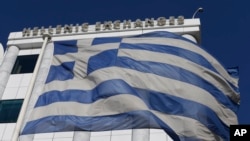The International Monetary Fund failed to demand debt relief as part of Greece's 2010 bailout despite widespread staff views that this was critical to the program's success, an internal audit report showed on Thursday.
The IMF also did not make a serious attempt to quantify the risk of financial contagion throughout Europe that was used to justify its granting of "exceptional access" funding to Greece when the country's debt was widely viewed internally as not having a high likelihood of repayment.
The decisions, made in the throes of a growing debt crisis, contributed to a program that proved unsustainable as Greece's economy collapsed, the IMF's Internal Evaluation Office (IEO) said.
The 30 billion-euro IMF program for Greece needed renegotiation in 2012, and the IMF is not yet a participant in a third bailout as it is now insisting that European lenders provide debt relief to Greece.
"Critically, there was no rigorous attempt to articulate a convincing path to restoring debt sustainability in Greece, other than a program of official financing, fiscal adjustment and structural reforms," the IEO said of the IMF's actions in 2010.
The IEO said the IMF's rules on granting exceptional access, which require early board involvement, were "followed only in a perfunctory manner." Amendments to create a "systemic exemption" that allowed the Greek bailout to proceed departed from the Fund's usual deliberative process where major decisions receive careful review, the IEO said.
In January 2016, the Fund eliminated the special exemption which also paved the way for bailouts to Ireland and Portugal and enacted new rules governing such large bailouts.
Even though some senior IMF staff members did not believe that Greek debt in 2010 was sustainable, the report cited "pressure" to agree to the bailout, adding that then-managing director Dominique Strauss-Kahn decided "to go along with the decision already reached by European policymakers and take a chance" that stability in Greece could be restored without pre-emptive debt restructuring.
By contrast, the IMF's bailouts of Ireland and Portugal went far more smoothly, the IEO report said, helped by strong "national ownership" of the programs and implementation of required reforms.
Senior IMF officials said there were many lessons learned in the Greek bailout and acknowledged that their fiscal projections were too optimistic, that they underestimated the political resistance to structural changes in Greece and that the program relied too heavily on budget cuts that deepened a recession. But they noted their main aim in 2010 was to prevent financial contagion that threatened to engulf Europe. Among its recommendations, the IEO said the IMF should
develop procedures to minimize room for political intervention in the IMF's technical analysis.
IMF Managing Director Christine Lagarde said in a statement that she believed the IEO did not adequately prove that the IMF's technical analysis came under undue political pressure and disagreed with the need for new procedures.
Including Greece, Portugal and Ireland, she said the IMF's involvement in the euro zone crisis programs was a "qualified success".
"Greece, however, was unique: while initial economic targets proved overly ambitious, the program was beset by recurrent political crises, pushback from vested interests and severe implementation problems that led to a much deeper-than-expected output contraction," said Lagarde, who replaced Strauss-Kahn in 2011 after he resigned amid a sexual assault scandal.








